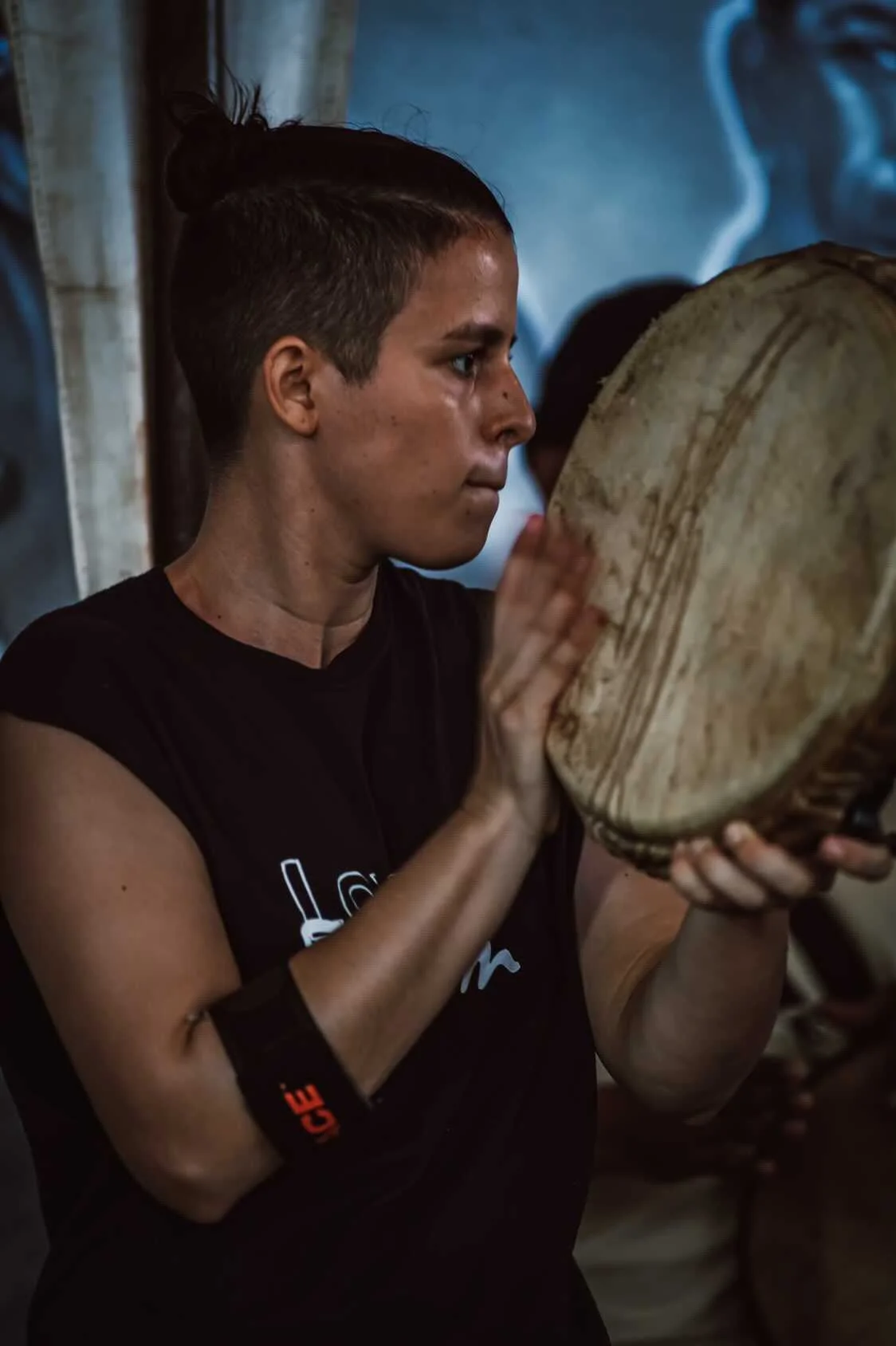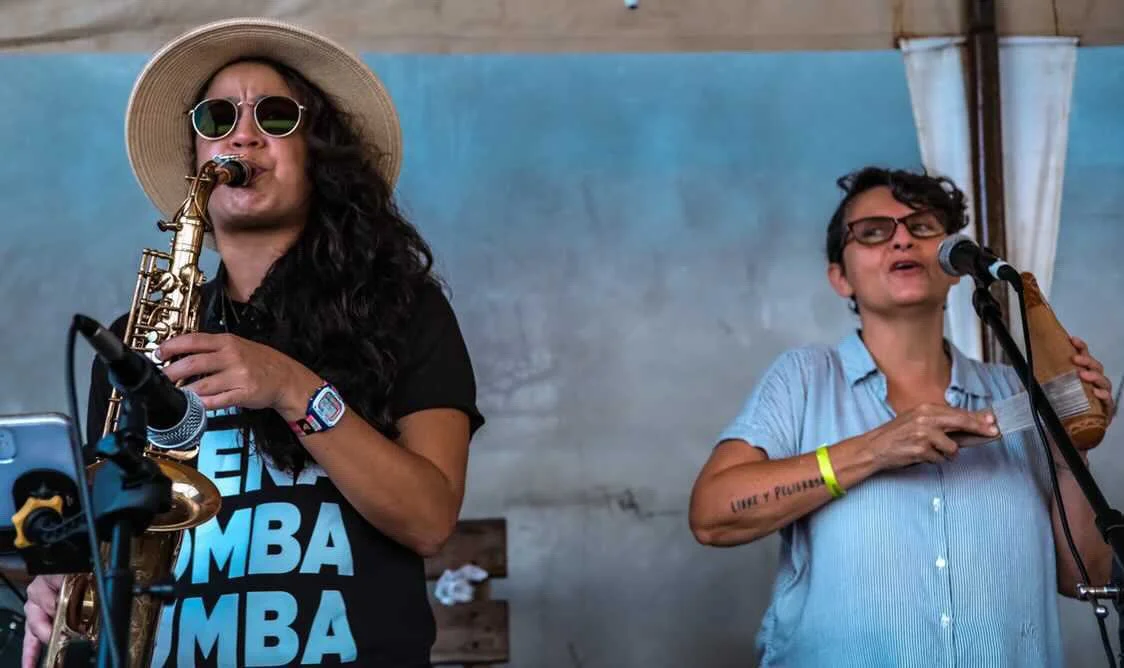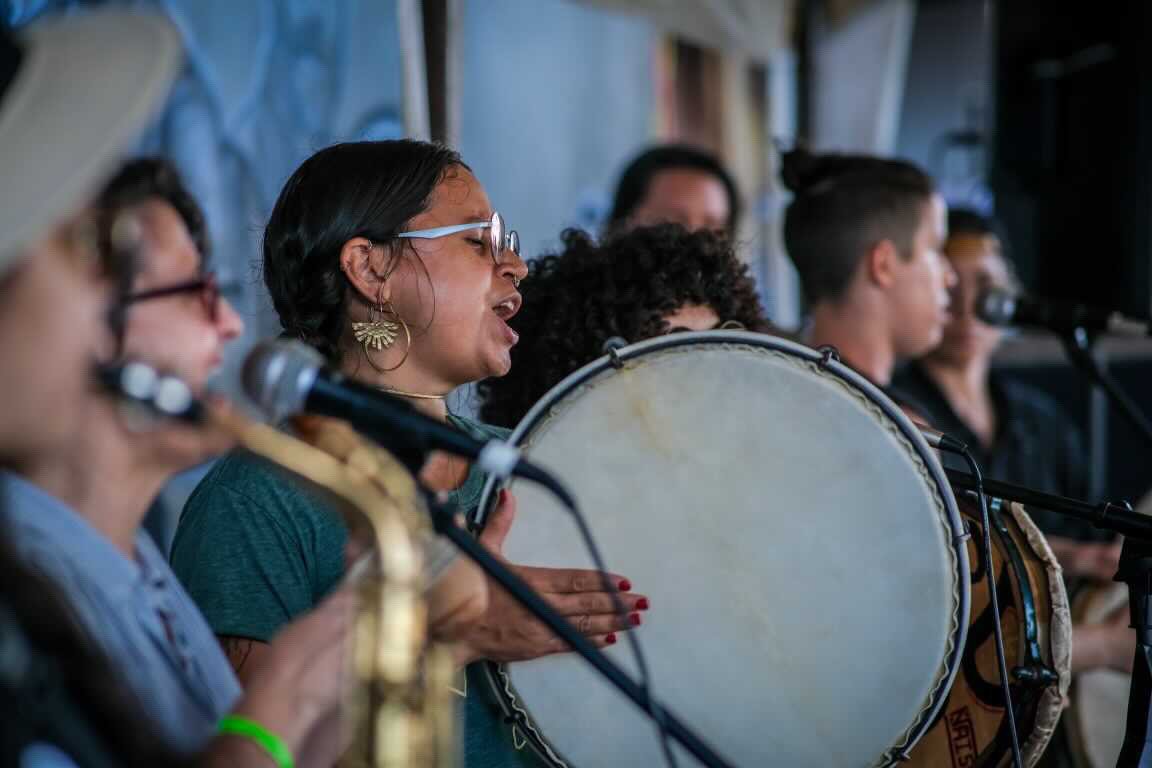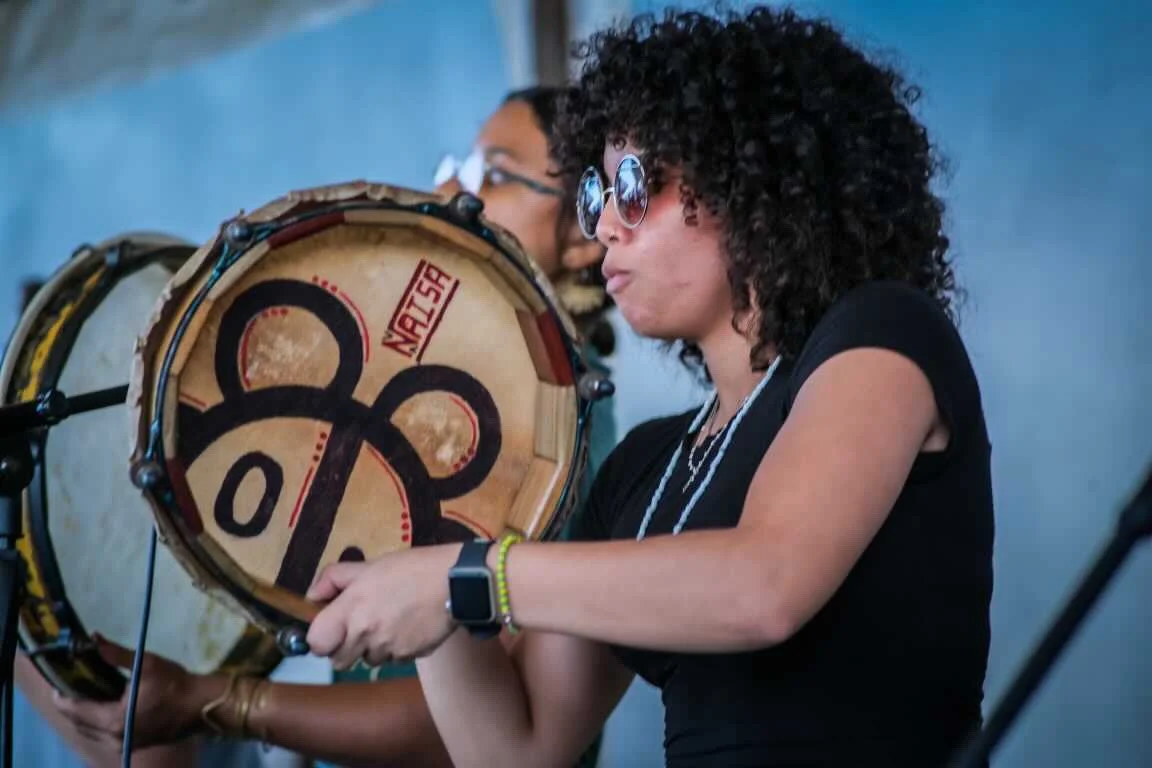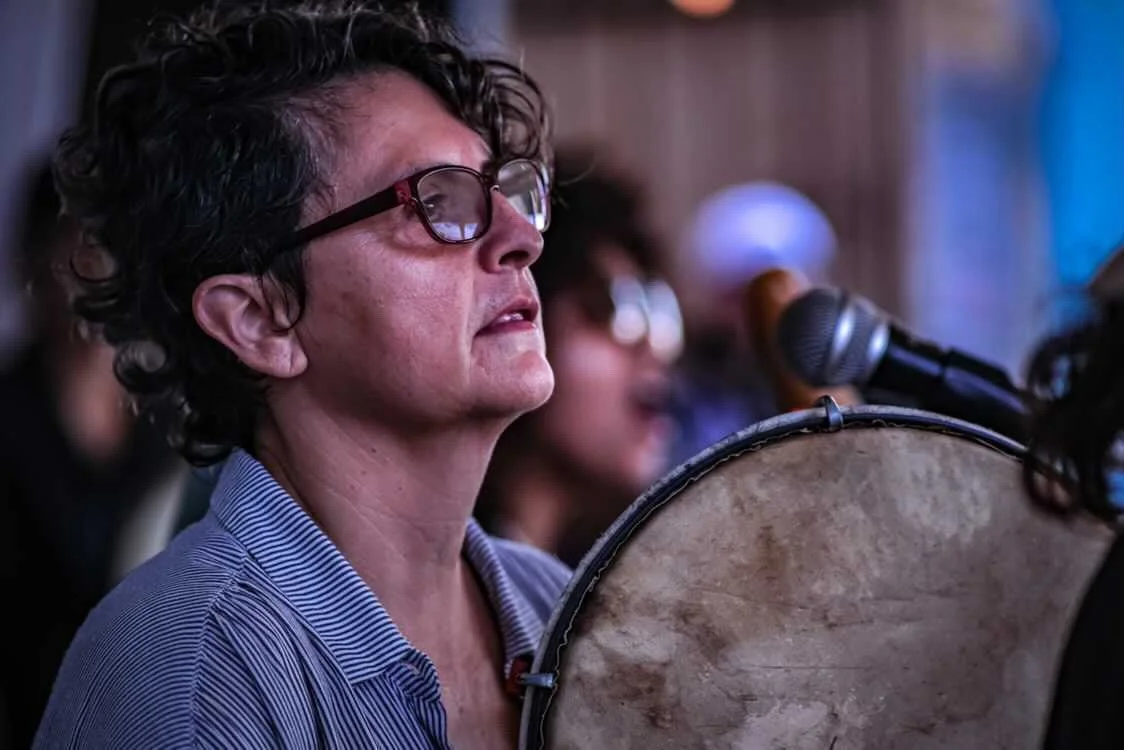Afro-Puerto Rican Plena Fights Erasure With Queer Collaboration
Puerto Rico’s cuir¹ community is leading a revolution that’s both external and internal. In the midst of the economic, political and social crisis that comes with the Archipelago’s colonial status, cuir people are taking on the huge task of creating safer, healthier, and more transgressive spaces that model new possibilities for current and future generations. As part of this movement, we see cuir people of all gender identities and expressions reclaiming the drums and music that oppressive gender norms and stereotypes traditionally reserved for cisgender heterosexual men. One of these reclaimed musical forms is Plena.
What is Plena? Plena is resistance. Plena is song. Plena is celebration. Plena is protest. Plena is rhythm. Plena is work. Plena is community. As one of our Afro-Puerto Rican musical genres, today Plena is played² with three hand drums called panderos or panderetas and the güiro or güícharo, a percussion instrument made of dried higüera fruit. Played by pleneras, pleneres, and pleneros, it orally transmits the joys, sorrows, stories, and struggles of Boricua life, from its birth in the early 1900s to the present day.
Rejected by government institutions, their racism and classism evident, Plena was first banned, then appropriated as part of an oppressive folkloric and mixed racial identity discourse³ meant to brainwash Puerto Ricans into thinking people of all skin colors are treated equally. As explained by Plena’s founders—Afro-Puerto Ricans working at sugar cane plantations, factories, construction sites and other agricultural industries—the cops were frequently called on Plena music.⁴ For years, players were arrested and their music was labeled noisy, criminal, and inferior.⁵ As part of their community organizing, Black Boricuas wrote Plena songs that sang their truth of undignified working conditions and low wages. Rafael Cepeda’s protest Plena narrated the Puerto de Tierra’s dock workers strike:
Hay huelga
en Puerta de Tierra
porque los trabajadores
están en protesta.⁶
In another example, workers who built San Juan’s financial district and were displaced from their barrio to welcome big US companies and gentrification would sing:
Lamento yo voy cantando
Lamento se oye en mi voz
Lamento porque mi barrio
Ya desapareció.⁷
In a nefarious turn of events, white Puerto Rican government officials began appropriating the Black music they once persecuted. Plena was suddenly a symbol of our African heritage in a supposedly harmonious mixture of the three races that composed the newly branded Puerto Rican identity: Indigenous, Spanish, and African. Conveniently filtered to sustain this mestizaje discourse, only some Plena songs were funded and supported. Protest Plena songs that demanded better working conditions or called out institutional racism and classism were labeled as problematic and discarded, while Plena songs regarding neutral or universal themes were considered folkloric and traditional. In trying to erase Plena's transgressive essence, the Puerto Rican government officially defined Plena as the “sung newspaper” of the people. However, as Puerto Rican plenero and musical anthropologist Ramón López explains, Plena was created to narrate whatever its people felt worthy of sharing through song.⁸ Therefore, Plena would never succumb to the censorship and whitewashing commonly seen in a newspaper publication.
The Afro-Boricua and Afro-Caribbean men and women that created this genre understood that Plena was made by the community and for the community. And yes, there were pleneras from the very beginning. For all we know, there were non-binary and trans Plena players from the beginning, too. One of the first and most important figures to learn about is Carola Clark, a Black woman from the 1920’s, daughter of Barbadian immigrants, who was so good at playing the pandereta that a song was written about her percussive excellence:
Elena baila bien
qué bueno canta Lola
pero en la pandereta
la mejor es Carola.⁹
Carola Clark’s contribution as a founder of Plena music established Black women’s undeniable role as protagonists of this Afro-Puerto Rican genre from its very start. Fast forward the many decades of oppressive gender roles limiting cis women’s participation in Plena percussion and composition, and you get the resurgence of cis Puerto Rican women taking back what was rightfully theirs. Talented pleneras began fighting for their right to sing lead and play panderos, usually within a sea of cis heterosexual men. All cis women Plena groups began emerging in Mayagüez and San Juan. Feminist protests would suddenly be flooded by dozens of pleneras, this time joined by trans and non-binary pleneres, pleneras and pleneros. Making their way into existing cis-hetero male dominated Plena spaces and creating their own, cis and trans women, as well as trans and non-binary Plena players, committed to leaving their mark on this Afro-Puerto Rican genre.
In 2021, Linda Nuñez, Naisa Santana Rivera, Margarita Morales Marrero, Janice Maisonet and I co-founded “Junte de Plenerxs,”¹⁰ a collective of cis women and cuir Plena players that celebrate and invite non-binary and trans Plena musicians to come together to share our Afro-Boricua Plena music in any corner or stage. Singing original as well as traditional and reinterpreted Plena songs, we resist colonial erasure of our Afro-Boricua culture and the imposition of oppressive binary gender norms. By rotating all percussive instruments and lead singing responsibilities, the group strives to eliminate hierarchical tendencies and create a space that invites community participation. Playing at different bars and local hangout spots, Junte de Plenerxs openly uses gender-inclusive language and states its mission to pass on Plena to people of all gender identities. The group’s current posts hope to create a directory that documents and celebrates cis and trans women as well as non-binary and trans Plena players of different experience levels and trajectories.
Besides its local gigs, the group aspires to have international cultural exchanges with other cuir musicians around the world, as well as host monthly plenazos where cis and trans pleneras as well as trans and non-binary pleneres, pleneras and pleneros, especially those who are part of the LGBTNBIAPQ+ community, lead and connect through Plena music.
While these initiatives contribute to the participation of the cuir community in Plena music, it’s important to recognize that that’s not the only participation we should be looking for. Puerto Rico’s mixed race discourse has sustained Latino anti-blackness,¹¹ and this manifests in our music. We say that Plena is our Afro-Puerto Rican genre, yet white Plena musicians fail to acknowledge and address how they monopolize Plena spaces and center their experiences over those of Afro-Boricua pleneras, pleneres, and pleneros. Those of us who are white Plena musicians need to start changing the way we participate in these spaces. We need to make sure that our fellow Afro-Puerto Rican Plena players get “mic priority”. We need to reflect on the lyrics that we sing and eliminate racist songs. We need to shut up and listen when we’re being called out on our racism. We need to confront other white Plena player’s racist comments, attitudes and practices, as well as our own. We need to share and pass on Plena knowledge in a way that is accessible to all, especially Afro-Puerto Rican children and youth. We need to always give credit to the Black communities that founded and preserved this genre. We need to stop contributing to their erasure and move towards making reparations.
Plenazos should be spaces of equality that celebrate Puerto Rico’s Afro-legacy and culture, while maintaining anti-racist practices. However, that won’t be possible if white Plena players don’t educate themselves of their manifestations of racism and do the work to change. We don’t have all the answers. We won’t have all the answers. We’ll make mistakes. But we have to care enough to try, to listen, and to do something about it. This is the Plena we want. This is the Plena we need. This is the Plena we hope to work towards.
—
Notes
¹ Latin American and Caribbean Spanish speaker’s re-appropriation of the word queer, meant to bring a decolonial perspective specific to the Latin American and Caribbean queer experience. Will be used throughout the article. See "A Seminar on Cuir/Queer Approaches to Knowledge Sharing Through Performance." OCA, oca.no/programme/gestures-and-nods.
² See "La Plena - Tito Matos." YouTube, uploaded by Latin Percussion, www.youtube.com/watch?v=Q6Rk46KJRr0.
³ For the Puerto Rican Culture Institute’s documentary on plena, see "La Plena." YouTube, uploaded by Dennis Flores Miranda, www.youtube.com/watch?v=vjQfgbAmozQ.
⁴ For Rafael Cepeda’s interview regarding police beating of plena musicians, see "Plena Is Work, Plena Is Song." YouTube, uploaded by Sorongo, youtu.be/iAsX3qi0Kg8?t=448.
⁵ See López, Ramón. Los Bembeteos De La Plena Puertorriqueña. Ediciones HuracáN, 2008. p. 15.
⁶ For Rafael Cepeda’s interview regarding the dock workers of Puerta de Tierra, see "Plena Is Work, Plena Is Song." YouTube, uploaded by Sorongo, youtu.be/iAsX3qi0Kg8?t=577.
⁷ For the testimony of these displaced workers, see "Plena Is Work, Plena Is Song." YouTube, uploaded by Sorongo, youtu.be/iAsX3qi0Kg8?t=1420.
⁸ See López, Ramón. Los Bembeteos De La Plena Puertorriqueña. Ediciones HuracáN, 2008. p. 26.
⁹ See López, Ramón. Los Bembeteos De La Plena Puertorriqueña. Ediciones HuracáN, 2008. p. 192.
¹⁰ For more information on the group, see Junte de Plenerxs on Instagram.
¹¹ For more on Latino Anti-Black Bias, see Hernández, Tanya Katerí. Racial Innocence: Unmasking Latino Anti-Black Bias and the Struggle for Equality. Beacon Press, 2022. pp. 14-16.
Adriana Santoni Rodríguez is a Puerto Rican percussionist, plena musician, singer, composer, educator, activist and social worker. On november 2017, she/they/he founded an all women feminist plena group, Plena Combativa, where she/they/he stood out as musical director, composer, lead singer and requinto player. The group focused on sharing plena as a valuable protest and social justice tool, as well as showing women as protagonist of this Afro-Puerto Rican genre. With Plena Combativa, Adriana played at festivals, local businesses, and theatres all around Puerto Rico. Their international participation included the “Festival del Caribe” Festival in Santiago, Cuba, the Lolita Lebrón Centennial held by Hostos Community College in South Bronx, and the “Encuentro de Jóvenes Artivistas” Activist Conferene in the Basque Country. On July 24 2019, the group launched it’s album “Plena Combativa”, the first Puerto Rican Plena album recorded by an all women plena group.
Focused on Afro-Caribbean genres such as salsa, plena, bomba and rumba; Adriana is currently working as percussionist and singer for 2018 Latin Grammy nominated group Yubá Iré, as well as Los Majaderos de Cachete Maldonado, and Bomba Pa’l Pueblo. In 2021, she/they/he co-founded Junte de Plenerxs, a collective of cis women and cuir Plena players that celebrate and invite non-binary and trans Plena musicians to come together to share their Afro-Boricua Plena music in any corner or stage. Adriana has collaborated with international artists such Jorge Drexler and Giovanni Hidalgo, as well as local indie artists: El Hijo de Borikén, Atabal, and María José Montijo.


